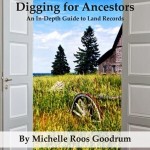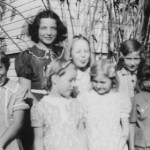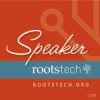
Yesterday I went into my basement family archive looking for my aunt’s wedding album (yes, the basement is temperature controlled). The album wasn’t upstairs in the house carefully stored in an archival box. . . it had to be downstairs, somewhere in the Holding Zone. That’s what I call the precarious tower of banker’s boxes and bins containing all the stuff a genealogist can’t throw away when clearing out a relative’s estate.
Our basement storage closets are full of outgrown toys, my yarn stash, seven years worth of tax records and other household leftovers. A bank of metal file cabinets holds haphazard bundles of family letters, photos, and other papers inherited along with the file cabinets. But that’s where the storage ends. The middle of the room is filled with boxes of personal items yet to be “processed” — evaluated, organized, and stored in real archival storage containers.
Someone dies and the house or apartment needs to cleaned out FAST! You open a drawer and find an assortment of rubber bands, bank receipts, and old letters. There’s no time to stop, read the letters, wonder why your destitute uncle has a receipt for a $25,000 bank deposit. So, you shove everything into a box and take it home to sort later. And five years later, you are still looking at that box.
Too many estates in too few years!
As I looked through boxes for Auntie’s album I discovered an entire box filled with financial papers, which got me thinking:
Why am I saving this stuff?
Truly, what would you do if someone mailed you the 20th century escrow papers for your grandparent’s home? It would include pages and pages of legal boilerplate and multiple copies of the same. The actual Title Deed would probably be absent.
What would a genealogist glean from all that paper:
- the fact that your grandparents were able to own their home
- address and location of property
- your grandparents full legal names and signatures, with addresses
- purchase price and terms of sale for the property
- property seller
- potential notes on property improvements, non-compliance
- possibly tax rate, insurance costs, hazard liability
If your family member bought and sold several homes or property parcels, you’ll be able to build a picture of their movements, their relative financial situation, and maybe social status as well.
Working with property records found in a relative’s home after they pass away is no different than working with property records on microfilm in the Family History Library. You still have to pull out the useful information, analyze what you find, and use the data to build a profile of your ancestor. All this takes time, which begs another question. Why do it at all? Unlike early land records, these papers are unlikely to shed light on murky kinships. And as for understanding the community: I’ll learn more about the area from local histories and maps than poring over modern escrow papers.
On the other hand, this is just the kind of information that will add color and detail to a biography or sketch. My grandparents never owned a home and moved from house to house exchanging my grandfather’s labor as a housepainter for rent. Auntie remembered living in more than two dozen different houses and apartments as a child, so it’s not surprising that she bought a home with her teacher’s salary as soon as possible.
Let It Go?
But, I’m thinking it might be time to let some of this stuff go. To the shredder. I’ll go through the box and extract dates, addresses, sale prices. I might save the cover sheet of sales, or at least scan the paper for a digital file. But I don’t need to save all the paper to save the story. Instead, I’ll use the space for an archival storage box to hold Auntie’s wedding album and diary, there’s not much boilerplate in those pages.
P.S. — This is not an easy decision. What do you think? Have you been there, done that? Regrets? Is there something I’m missing, a reason I should hang on to every scrap?
Photo: Paper Party by Jason Sussberg, Flickr CC 2.0 https://flic.kr/p/4hQAqK






I vote hang on to it. Perhaps box it up with the notation on the lid that it's been scanned.
I have NOTHING, not a shred of paper, not a memento, not anything of my ancestors. Until I started doing genealogy 4 years ago I didn't even know my mother's parent's names. I read blogs and people have photographs and wills and letters. I have NOTHING. I would be thrilled to death to find a receipt for a load of coal or anything at all from anyone, even the neighbor who left something with my ancestor's name on it. It's not much different than being adopted. And I have that idea in the back of my mind, too.
Thanks, Robyn, Mary Beth, and DonnaP – You are cheerleaders for this insanity. I really need to make this my mantra for a while. And thanks too, Jana, for stopping by and adding this post to your weekly list. Now back to the archives. . .
Denise,
I want to let you know that your blog post is listed in today's Fab Finds post at http://janasgenealogyandfamilyhistory.blogspot.com/2015/01/follow-friday-fab-finds-for-january-30.html
Have a great weekend!
Let it go! It's not useful, memorable, valuable, or collectible. It's just clutter…
I have a bit of the same problem with some of my great-grandfather's receipts for misc. stuff and deposit slips? All financial information that doesn't really give information and takes up room. But it's sooooo hard to get rid of anything.
Hi Denise,
I think you're doing the right thing. I can identify because I find it hard to part with that kind of stuff as well, but you have to draw the line somewhere I guess. Scanning is a great option so at least you have a copy to go back to later. The boxes of paper just get to be too much otherwise. It's definitely not an easy decision though. I feel sentimental about everything!